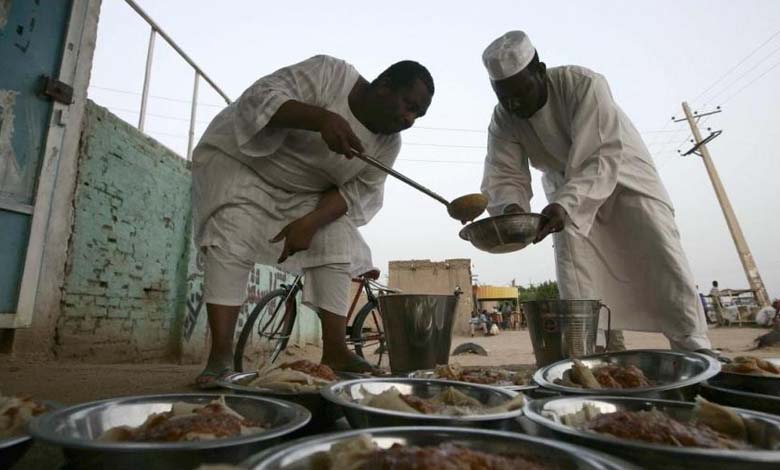Sudanese During Ramadan: Amidst Battle Fires and the Threat of Famine

In Sudan, where war has been ongoing for nearly a year and the specter of famine looms, Sudanese speak bitterly about their daily reality.
Othman Idris, residing in the Al-Azhar neighborhood south of Khartoum, says, “For months now, we’ve been close to fasting. We have one meal, rarely prepared at home. We obtain it from the neighborhood kitchen at the mosque. But unfortunately, the kitchen stopped two weeks ago due to a lack of funds for those running it,” according to the Agence France-Presse (AFP).
Before the war erupted during Ramadan 2023 (April/May that year) between the army led by Lieutenant General Abdul Fattah al-Burhan and the Rapid Support Forces led by Lieutenant General Mohamed Hamdan Dagalo “Hemetti“, Idris owned a food shop in the eastern part of the capital, but the fighting forced him to close it.
Due to bombings, airstrikes, looting, and killings in the streets, Idris couldn’t return to his shop or his neighborhood in east Khartoum.
However, Mohamed Suliman persisted, despite everything and after 11 months of fighting, to keep his shop open in the town of Ar Rahad, 70 kilometers east of Al-Ubayyid, the capital of North Kordofan State, where the Rapid Support Forces control large parts, including Ar Rahad.
Suliman says, “Goods are very scarce, and even if available, their prices are high due to the taxes imposed on vehicles by the warring parties.”
As for customers, they have become scarce, and their purchasing power is “very weak,” with many having lost their jobs while others saw their savings disappear in home looting, while some were already suffering from hunger before the war in one of the poorest countries in the world.
A few weeks ago, the last safety net was broken when communications were cut in many states, leading to the suspension of the Sudan Bank app, which allowed receiving transfers and exchanging money.
Imad Mohamed, for example, relied on transfers from relatives abroad, which he received through this app to provide food for his family despite the devaluation of the Sudanese currency and triple-digit inflation.
Mohamed, who works as a teacher in a school, says, “For eleven months, I haven’t received my salary.” And he adds, “We enter Ramadan, and we are closer to hunger than ever, with no preparation.”
According to UN estimates, 18 million out of 48 million Sudanese suffer from acute food insecurity, with five million teetering on the brink of famine.
Hungry Children
In the Zamzam displaced camp in northern West Darfur, Sudan, a child dies of hunger every two hours, according to Doctors Without Borders (MSF).
On the other side of Darfur, Isaac Mohammed, a family head of eight living in the Kalma camp for the displaced near Nyala, the capital of South Darfur State, exchanges with AFP via messaging app using internet via a satellite Starlink device: “For several months, we have only one meal, and sometimes we leave it for the children. Organizations left due to the war, and we can’t work if there’s any, due to the security situation.”
Experts, including Abex Duval, believe that many Sudanese are already left to their fate.
Duval says, “Ten or fifteen years ago, any UN donation appeal would at least meet two-thirds of the required amount. Today, the appeal for Sudan has only received 3% of the amount requested.”
A researcher specializing in Sudanese affairs believes that famine has already begun, adding that the lack of precise numbers and data on hunger until now “doesn’t mean we should turn a blind eye.”
Nahed Mustafa, from the village of Taybah in Gezira State in central Sudan, says, “This Ramadan has no taste; we couldn’t prepare its drinks because of our financial conditions, we struggle to find something to eat.”
In that state, Khartoum residents used to spend their weekends between the arms of the Blue Nile and the White Nile. But today, the smell of Ramadan drinks no longer rises from the houses, replaced by the smell of gunpowder.












